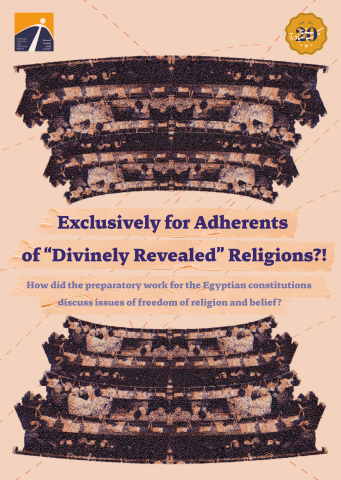EIPR publishes a new paper about freedom of religion in the travaux préparatoires of the constitutions: Exclusively for Adherents of “Divinely Revealed” Religions?!”
Despite this, Egyptian constitutions prior to 2012 did not use the term “divinely revealed religions” nor was the concept constitutionally linked to the limits of reli- gious freedoms in the country. The pre-2012 constitutions had been satisfied with guaranteeing freedom of belief and the freedom to practice religious rituals in a manner that does not conflict with public order and public morals.
This sparked de- bate over the limits of religious freedoms allowed under these texts. Judges referred to the preparatory work for the 1923 constitution to deduce their interpretation of these articles, which supports the restriction of religious freedoms to the followers of “divinely revealed religions” alone. Judicial rulings continue to be based on the reasoning found in the preparatory work for the 1923 constitution, even in the presence of an explicit constitutional text that supports the opinion of limiting reli- gious freedoms to the adherents of “divinely revealed religions” since 2012.
This paper seeks to reconsider the preparatory work for the Egyptian constitutions of 1923, 2012, and 2014, which witnessed important debates about the limits of religious freedom in Egypt. The aim is to discuss the most prominent arguments used in judicial rulings in the context of lawsuits that demand raising the ceiling of religious freedoms in Egypt and guaranteeing some religious freedoms to those who do not follow the three “divinely revealed religions”. The paper also aims to identify the different orientations in discussions among elites, the different positions of these elites across the Egyptian political spectrum in relation to freedom of religion and belief, and how these positions were reflected during the preliminary deliberations of drafting constitutions.




